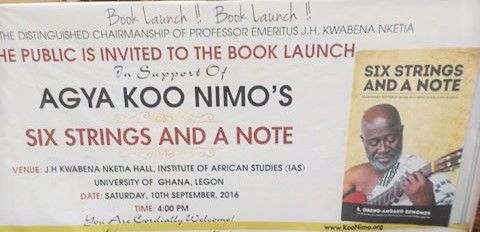The brand new biographical book, "Six Strings and a Note", which chronicles the life of the famous original palmwine Highlife Maestro, Koo Nimo (born Kwabena Boa-Amponsem on October 3, 1934 and baptized Daniel Amponsah) has been launched at the Institute of African Studies (IAS), University of Ghana-Legon.
The book was written by Prof E Obeng-Amoako Edmonds.
Born in the village of Foase, in the Atwima District of the Ashanti Region in Ghana, West Africa, he worked in various jobs in science and medical-related fields while maintaining his interest in music. In 1957, when the former British colony of the Gold Coast became the independent country of Ghana, Koo Nimo first received national acclaim through the formation of the ‘Addadam Agofomma’ ensemble.
Many of his songs tell traditional stories and are sung in the language Twi. Along with one or two guitars and vocals, the traditional Ashanti palmwine ensemble consists of traditional instruments of West Africa, including the ‘apentemma’ and the ‘donno’, the ‘frikyiwa’ (metal castanet), the ‘prempensua’ (rhumba box), the ‘ntorwa’ (hollow gourd rattle with beads or seeds woven around it on a net), and the ‘nnawuta’ (consisting of two iron bells that provide the key rhythmic pattern) or ‘dawuro’ (banana-shaped bell).
In 1979, in recognition of his services to Ghanaian music as performer, teacher and administrator, Koo Nimo was elected President of MUSIGA (the Musicians' Union of Ghana). His countrymen appreciated not only his music, but his love of and respect for tradition. In 1985 Koo Nimo was appointed interim chairman of COSGA, the Copyright Society of Ghana.
More recently, he has been made an honorary life member of the International Association for the Study of Popular Music, along with such distinguished names as Professor J.H.K. Nketia and John Collins.
In 1990, eight of Koo's songs were released on a compact disk entitled ‘Osabarima’. This was the first work by a Ghanaian artist to be put on CD in the words of High Fidelity Magazine (September 1990, 103). In February 1991, in recognition of his services to music and to his country, Koo received the prestigious Asanteman award from the Asantehene.
In March, he received the Flagstar Award from ECRAG (Entertainment Critics and Reviewers Association of Ghana). In 1991, he was invited to serve on the National Folklore Board of Trustees. In January 1992, at Columbia University, New York, USA, Andrew L. Kaye presented his dissertation entitled "Koo Nimo and his circle: A Ghanaian Musician in Ethnomusicological Perspective" and was awarded a Doctor of Philosophy degree for his work.
In March 1997, the Ghana government celebrated the fortieth anniversary of independence by awarding gold medals to forty of its distinguished citizens, one of whom was Koo Nimo. This was in recognition of his efforts to preserve traditional culture. In the next month he received the ‘Konkoma’ Award for his contribution to Ghanaian Highlife Music.
Â
In 1998, he was employed as a Professor of Ethnomusicology at the University of Washington in Seattle, USA, for two years, before taking a similar position at the University of Michigan in Ann Arbor. As of 2006, Koo Nimo moved back to Ghana and is currently living in Kumasi.
Kweku Darko Ankrah





